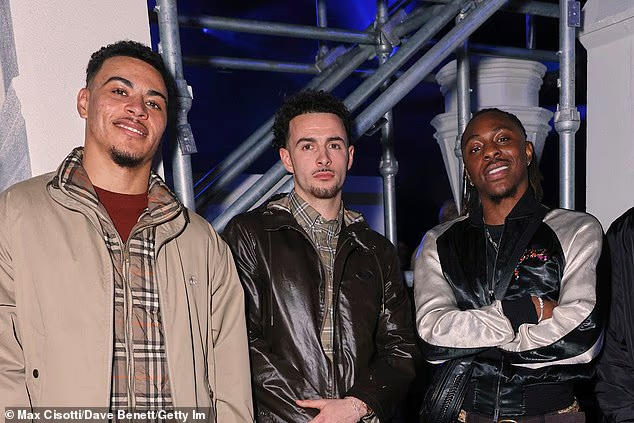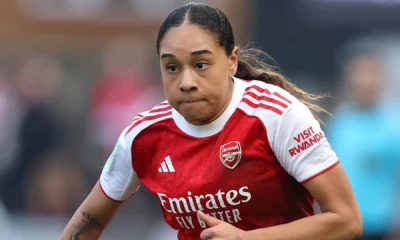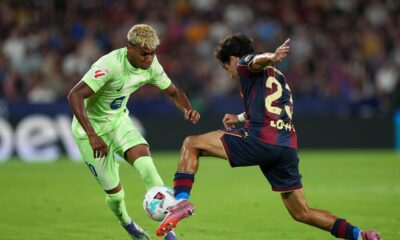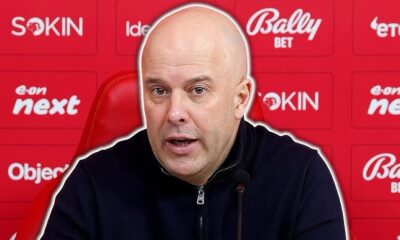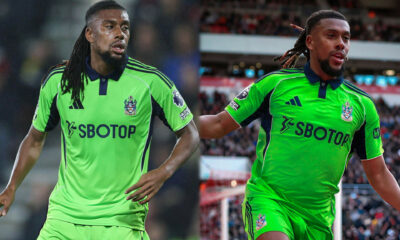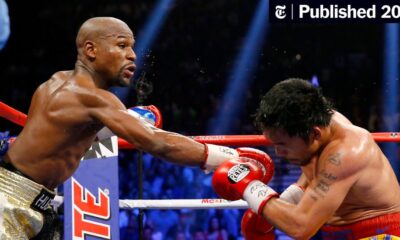Sports Analysis
Nigeria Football and Dalung’s Crocodile Tears
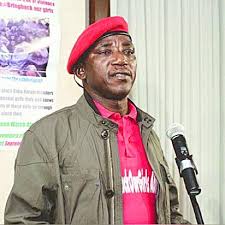
By Fred Edoreh
Ordinarily, it is justifiable for any Nigerian to feel concerned that the Super Eagles opened their first two 2026 World Cup qualifying games with draws to supposedly weaker teams, Lesotho and Zimbabwe, keeping them at two points from possible six and leaving South Africa, in the same group, possibly with a headstart of four points.
That was the subject of former Sports Minister, Solomon Dalung’s lamentation in a recent interview in Kunle Solaja’s Sportsvillagesquare.com interestingly titled “My Eyes Are In Tears…”
First, in as much as the start is truly shaky, it must be noted that there are still eight more matches to go in the qualifiers and true leaders must give hope to encourage and inspire, for as is the case with sports, the Super Eagles can turn the table along the line.
The issue for me, however, is that if anybody should lament about our football, it should not be Dalung.
His tears is simply like the tears shed by the crocodile to mock the suffering of its prey. At best, his intention was merely to cash on the situation of the Super Eagles to launder the odious image he earned from the terrible afflictions he brought upon Nigerian football while as Sports Minister.
Things don’t just happen, there is always a cause, and the difficulties of Nigeria football today gained root from Dalung’s haughty mal-ministration of Nigeria sports.
His tenure was marked by not just serious undermining of the NFF and it’s leadership, but deliberate, calculated and orchestrated decapitation of the body and soul of our football.
It cannot be forgotten how, immediately he was appointed Minister in 2015, he exhumed the dead case of Chris Giwa’s bid for the NFF presidency to ferociously destabilize the administration – aiding it’s dragging from one Jos court to another, pleading unfounded claims of Supreme Court orders and blatantly disregarding and denying counterpart government funds for the development and management of our various national teams.
His inimical posture against the success of our national football was first displayed when he not only starved the Samson Siasia led U-23 team of funds whilst camping in Atlanta in preparation for the Rio 2016 Olympic Games.
Who can forget his infamous “what are there for?” or “the money spended was well spended,” as he lost all caution in his attack on the team?
It was to the extent that Mikel Obi, being captain of the team, was reported to have personally paid part of the accommodation expenses of the squad on arrival in Brazil and also provided some allowance for the players to keep their spirit together, while Dalung kept blabbing.
Despite his unreasoned harassment of the NFF, God shamed him, for at the end, the football team produced the only medal for Nigeria, a bronze, from that Olympic Games.
That team which he so mistreated should have formed the nucleus which would have matured the character of the Super Eagles into the present day, but Dalung did not care about the mental and psychological implication of his actions on the lads.
He even heightened the tempo of his attack on the NFF as the Super Eagles prepared for the Russia 2018 World Cup.
On arrival from Ndola from their first qualifying match against Zambia, which we won 2-1, we had the DSS waiting at the Nnamdi Azikiwe Airport, Abuja, to arrest officials of the NFF, ostensibly for not submitting to a purported court order to surrender the management of the domestic league to his preferred men.
He also significantly disregarded the funding needs of the team in most of the qualifying matches and at the World Cup proper, possibly so that the leadership of the NFF would be seen to have failed and to enable him invoke an atmosphere for the forced takeover of the Glass House by his Chris Giwa group.
They indeed forcefully took over the Glass House twice, with Dalung’s support and applause, until the Presidency ordered their dislodgement on both occasions.
We do not forget the disgraceful footages of Super Falcons players kneeling down before him to receive their allowances in the dressing room at the France 2019 Women World Cup as Dalung temporarily suspended the functions of the officials and substituted or combined his office as minister with that of treasurer of the women team.
At the inter-personal level, he was so full of hate for the then NFF President, Amaju Pinnick, that he went at length to work, howbeit clandestinely, against his election into the CAF Executive Committee and his appointment as CAF First Vice President.
Hand in glove with the deposed and disgraced CAF President Ahmad Ahmad, and in collaboration with Chief Okoi Obono Obla of the Special Presidential Investigation Panel, SPIP, also later disgraced and suspected to be in hiding, they concocted all manners of unfounded corruption allegations against him.
Most curious was their penchant to deliberately misrepresent the facts of NFF financial transactions before CAF and the government to feed their propaganda.
In one case, they merely latched on a document with which the NFF made a withdrawal of $565,471 to provide for five programmes, and mischievously distorted the narration to CAF and the Federal Government.
The items of the expenditure were clearly stated as including expenses for three NFF officials to the 2015 CAF Congress ($19,588), match expenses, players bonuses and allowances for Super Falcons second leg match of the 2016 Olympics qualifier against Mali ($237,161), same for the U-23 qualifying match against Zambia ($212,078), approved severance allowance for former NFF General Secretary Musa Amadu ($88,297) and NFF staff salary for February 2015 ($8,334), but they deceptively alleged that the NFF claimed to have expended the whole sum of $565,471 on the CAF Congress and frivolously instituted an investigation premised on their own falsehood.
Mischievously, on the very day CAF was to decide a new President, following Ahmad Ahmad’s suspension for corruption and misappropriation of funds, they surreptitiously sent a pretentious enquiry to the body, claiming that Pinnick who was most favoured to take over, was under investigation, just to thwart his chances of elevation. This led FIFA to designate Fatma Samoura as General Delegate to govern CAF for the period.
Laughably, when the Attorney General’s office in Nigeria called for the file of the investigation, they dodged from forwarding it.
These and a litany of more concoctions and orchestrations were as vicious as Dalung’s ministerial tenure was against the progress of Nigeria football and growth of its officials. Sadly for him, whom God has blessed, no man can curse, and Pinnick kept growing in relevance in world football.
Most ridiculous about Dalung’s tears for the Super Eagles is that his tenure was essentially defined by his campaign to de-affiliate Nigeria football from FIFA, following his failure to install his stooges to take over the NFF. It took series of protests by the world football governing body against his high handedness and finally a declaration by the Office of the Vice President, Yemi Osibanjo, to tame him.
Truly, if not crocodile tears, how can someone who maliciously solicited and advocated the withdrawal of Nigeria’s membership from FIFA now be shedding tears over the Super Eagles shaky start in the qualifiers to a World Cup organised by the same FIFA? “Ko le werk.”
It is just like a kidnapper mourning with the family of the kidnap victim, and that can only derive from disingenuous duplicity and pathological self deception.
It was for these cantankerous misdemeanors that President Buhari un-boarded him from the ministerial seat in his second tenure, accounting for the possible bitterness and depression he seems now to be suffering from, and the real tears in his eyes.

-

 Premier League1 day ago
Premier League1 day agoArsenal Star Olivia Smith Stretchered Off In FA Cup Scare — What It Means For The Gunners
-

 LaLiga1 day ago
LaLiga1 day agoHansi Flick Explains Lamine Yamal’s Frustration After Barcelona Win
-

 News1 day ago
News1 day agoAngry Arne Slot Slams Liverpool’s ‘Worst Performance’ Despite Late Win At Nottingham Forest
-

 Local News1 day ago
Local News1 day agoAlex Iwobi Masterclass Powers Fulham Revival At Sunderland
-

 Local News1 day ago
Local News1 day agoNaija Stars Abroad: Goals, Grit And One Absence That Shook Istanbul
-

 Premier League1 day ago
Premier League1 day agoAlex Iwobi: The Manager’s Dream Lighting Up Fulham’s Season
-

 More Sports4 hours ago
More Sports4 hours agoMayweather Vs Pacquiao 2: Boxing Legends Set For Historic Netflix Showdown In Las Vegas
-

 News3 hours ago
News3 hours agoArsenal Star Eberechi Eze Leads Premier League Glam Squad At London Fashion Week






